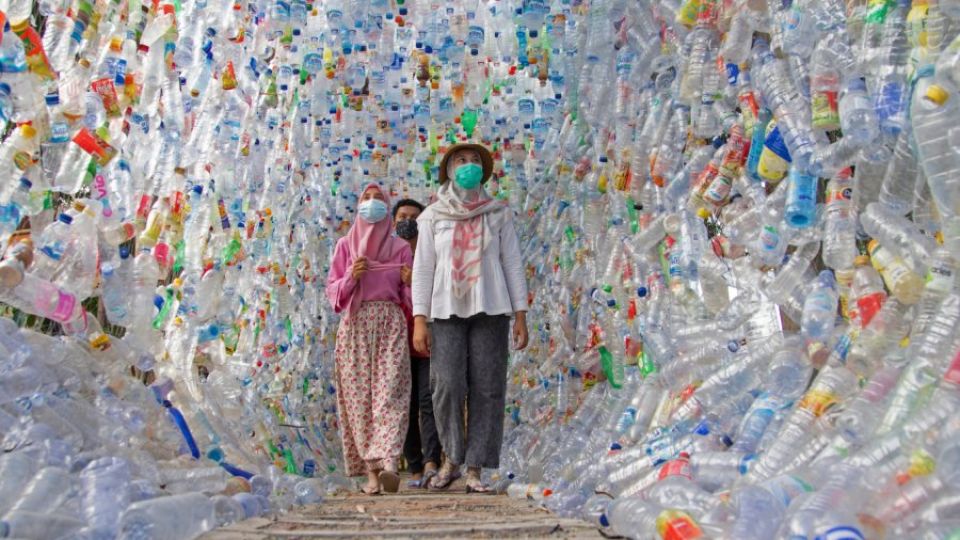May 25, 2023
JAKARTA – Indonesia’s delegation looks set to curb ambitions at an upcoming global forum on plastic pollution amid concern that some of the plans could harm local industries.
Ahead of the second session of the Intergovernmental Negotiating Committee (INC-2) on plastic pollution to be held in Paris from May 29 to June 2, countries vary in their response to plastic waste.
The United States, Saudi Arabia and other major plastic producers prefer national strategies, Reuters reported last week, while the so-called High Ambition Coalition consisting of Norway, Rwanda, New Zealand and the European Union is calling for global targets to reduce the production of raw material for plastic-based products and eliminate fossil fuel subsidies.
That proposal has raised concern from the Industry Ministry, local manufacturers and energy analysts, who say it would hamper Indonesia’s plastic industry that is already contending with a flood of imported products.
Ignatius Warsito, chemical, pharmaceutical and textile industries acting director general at the ministry, said the government would try to block the proposal for cutting virgin plastic production.
“We have been instructed by the industry minister to guard the virgin plastic [issue] in [the INC-2] in France. How can the world stop or reduce [the output of] plastic factories while it’s impossible to not use plastic?” Ignatius said on Tuesday, as quoted by news agency Antara.
Should the proposal be accepted, the ministry and industry players worry, it could hamper three big petrochemical projects to be implemented by PT Chandra Asri Petrochemical, PT Lotte Chemical Titan Nusantara and PT Pertamina by 2027. All are upstream suppliers for the plastics industry.
Investment for those projects may total US$18 billion, according to the Indonesian Olefin, Aromatic and Plastic Industry Association (Inaplas).
The government still supports efforts to protect the environment, according to Ignatius, who stressed however the need to continue that effort while allowing for further growth of the industry.
He pointed as an example to plastic raw material developed in biorefineries in South Korea as a way to reduce carbon emissions.
“We have prepared Indonesia’s position [on this issue]. We hope to create a balance between economic, environmental and social aspects [in the forum],” Ignatius stated.
Potential losses for local industry
Inaplas’ vice chairman Edi Riva’i opined that the proposal, if implemented, may increase virgin plastic imports to the country.
According to him, only 40 percent of domestic plastic raw material demand was met by local producers, resulting in annual net imports worth $2.8 billion.
“Indonesia’s production is still low, while other countries, like Singapore, China and Thailand, have oversupply. Thus, if we cannot build [new factories], their products will come here,” Edi said on Tuesday, as quoted by Bisnis.
If that happened, Edi said, the opportunity to employ 3.2 million people in new petrochemical plants may be lost.
Tauhid Ahmad, executive director at the Institute for Development of Economics and Finance (INDEF), admitted that the country was still flooded with imported plastics due to the limited local production capacity. He attributed that to relatively low import fees that rendered some local plastic uncompetitive.
The local plastic industry also faced challenges regarding production efficiency, Tauhid said.
“Thus, if the proposal to cut virgin plastic production is approved, it could prevent Indonesia from producing additional value and creating more job opportunities in the country,” Tauhid told The Jakarta Post on Wednesday.
He pointed out that some advanced economies also disagreed with the proposal to cut virgin plastic output.
“If developing countries that still need the industrial sector, with many of their people in the lower-middle income segment, were pushed to follow environmental issues 100 percent, I think society would become better but not prosperous,” Tauhid said.
Tauhid added that progress in environmental issues should be gradual, while local industries as the country’s engine of growth should continue to be developed as well.
He also said the government’s efforts to tackle the pollution of rivers and the ocean left room for improvement.
The government has considered various options to address plastic pollution, including a plastic credit scheme that would be similar to the carbon credit arrangement. Under the scheme, collected and recycled plastic would be converted into credits that could be sold to entities seeking to reduce their plastic footprint.
Some venture capitalist-backed tech start-ups, such as Octopus and Waste4Change, have made inroads into attracting people and companies to participate in recycling activities.
“We still can’t measure how much [plastic] we are recycling; that is another challenge,” Tauhid stated.


